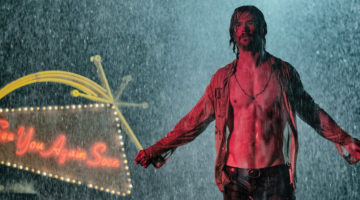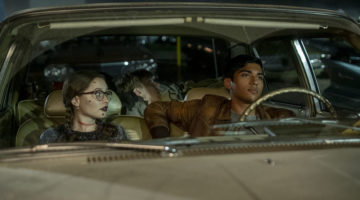Review: After the Ball
If the Canadian produced comedy After the Ball had been released in 1988 it probably would have killed with audiences. It’s a simplistic tale of success, business, romance, and nepotism that feels like a cross between a classic Cinderella story, Michael J. Fox’s The Secret of My Success, and the Twelfth Night aping cult curiosity Just One of the Guys. It’s breezy, lightweight, and only intends to give audiences a good time. It mostly succeeds, but only if one keeps a low bar for feel-good cinema.
Fresh out of school and desperate for a job, budding fashion designer Kate Kassel (Portia Doubleday) begrudgingly takes a job at the company owned by her father (Chris Noth). Her dad is rarely around, and her evil, power hungry stepmother (Lauren Holly) pretty much runs the show with her catty. doofus daughters (Anna Hopkins, Natalie Krill). Set up by her stepmom and fired by her own dad, Kate is coaxed by friends into rejoining the firm disguised as a man named Nate. Upon her return, she begins to gain the ear of her father again, but the ruse hampers acting on her crush on a quiet, shy shoe designer (Marc-Andre Grondin).
A great deal of charm comes from the fact that pretty much everyone involved with this production is overqualified for the task, but they never seem to be talking down to the material. Everyone seems engaged and having fun. Director Sean Garrity (My Awkward Sexual Adventure, Blood Pressure) delivers his sleekest (and probably most heftily budgeted) work to date, and the script from Jason Sherman and Kate Melville (the latter of whom wrote the delightful Picture Day) hits more gags than it misses.
Doubleday shows considerable comedic chops in the lead. Noth and Grondin are good sports, playing along with the absurdity with smiles and scowls where appropriate. Holly doesn’t go too far over the top, settling for “deliciously evil” instead of full-on scenery chewing. Hopkins and Krill steal every scene they show up in and have remarkable chemistry together. All that plus Colin Mochrie as a rival designer, and there’s an almost embarrassment of riches in front of and behind the camera.
But that considerable amount of talent works against the film in the long run. All of these people on their worst day can make even the bare minimum somewhat watchable, but unlike Kate’s elaborate scheming the film doesn’t seem to be actively trying to achieve anything. If you’ve seen any film from the 1980s, there’s precisely zero suspense to anything that happens. It’s telegraphed far in advance that the only way the film can end is via two sequences back to back: a scene where Nate and Kate have to be awkwardly in the same place at the same time and a scene where Kate has to cleverly dupe the villains and earn the respect of her father once and for all. That sense of wanton predictability dampens the fun, but when that’s combined with questions and threads that go unanswered or don’t make logical sense it amounts to a film that’s a rare example of a likable miss. Sure the writing is clever and the punchlines might be different enough to garner some chuckles, but every story beat from the clearance rack has been trotted out here.
Early on it’s said that Kate’s dad isn’t very well liked in the fashion world because he designs ready-to-wear knock offs made by haute-couturiers. It’s established as the reason why she can’t get a job anywhere else, so why does the film have to have her ludicrously infiltrate a company where people already know her? The fact that no one likes her dad never gets brought up again after the first ten minutes, and he seems like a pretty nice, reasonable, and hopelessly aloof guy the rest of the time. That’s confusing, but not as much as anyone buying Kate’s cross-dressing act. She still just looks like a really nerdy girl who glued a soul patch to her chin and adopted an accent that makes her sound like the gay Tony Clifton. I mean, come on, her fake dude name is one letter off from her real name and Doubleday’s eyes are so big and distinct that no one could mistake her for anyone else. And yes, this is one of those films where no one will look into Nate’s credentials and references until the story demands its final conflict.
Then again, that’s part of the fun. I’m almost positive everyone involved with this just said “Let’s make the best approximation of an 80s film we can.” That works, and considering the 80s turned out some of the best high concept genre films, I’m certainly not opposed to a throwback every now and again. Is it a great film? No, but if you want a few laughs that stick around about as long as it takes you to eat a box of gummy bears this might be for you.
[star v=25]




